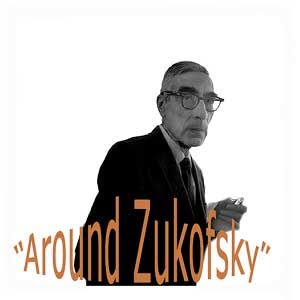Literary scholars to reassess writings of poet of obscurity
By Jennifer CarnigNews Office
 | |
Louis Zukofsky is one of the most influential poets you have never heard of. A poet’s poet, or maybe even a poet’s poet’s poet, Zukofsky produced work that is mostly unknown, but that does not mean it is without consequence.
Though he was largely ignored during his lifetime, Zukofsky (1904-1978) is now acknowledged as one of the most important American poets of his generation. But his own difficult yet lyrical work is not the only reason he should be studied, according to Robert von Hallberg, the Helen A. Regenstein Professor in English Language & Literature and the College. Since his death, Zukofsky also has become extremely influential.
“For poets under 40, he’s hugely important,” von Hallberg said. “He is now somebody young poets go to, even though he’s not being taught in universities. But that gives him the extra cachet of being a sort of secret source.”
The secret will be revealed Thursday, Nov. 11, and Friday, Nov. 12, when the University’s Poetry and Poetics Program sponsors “Around Zukofsky,” a conference honoring the birth centenary of the avant-garde poet.
This is the first conference put on by the new Humanities program Poetry and Poetics, an umbrella program that seeks to unite faculty members from all departments who share an interest in poetry. Von Hallberg, who has been at the University since 1973, said the commitment the division and Richard Saller, University Provost, have shown by encouraging the creation of the Poetry and Poetics Program makes this “the best moment for studying poetry at Chicago, by far.
“It’s a lively, exciting time,” he continued. “We’ve been able to attract the best graduate students possible, and that means that there is more happening here in poetry than anywhere else. This is the best place in the country to be right now.”
Addressing the importance of holding the conference on Zukofsky at this moment, von Hallberg said, “For years, academics disregarded him, but young poets have brought him back to life.” He added, “It’s time to go back and reassess Zukofsky’s work, to study its importance and impact.”
Born in New York to Russian-Jewish immigrant parents, Zukofsky’s first language was Yiddish. But he went on to study English at Columbia University and graduated in 1924 with a master’s degree in the subject, a major accomplishment in a time of anti-Semitism. It was in school that Zukofsky was first introduced to leftist politics, a theme that would soon influence his creative work.
In 1931, Zukofsky was invited, with Ezra Pound’s encouragement, to edit a special issue of Poetry magazine, the Chicago-based publication that helped establish and popularize young poets. Though never a card-carrying member of the Communist Party, Zukofsky was a sympathizer, and in his issue he presented a group of left-leaning avant-garde poets, the Objectivists. Included were William Carlos Williams, George Oppen, Carl Rakosi and Charles Reznikoff.
The Objectivists initially received attention because of the rapid growth of the American left after the 1929 stock market crash. “But it wasn’t just that they were leftists,” von Hallberg said. “It was that they were leftist avant-gardeists, which nobody had ever seen before. Ezra Pound and T.S. Eliot were on the right.”
Zukofsky helped usher in a new breed of poetry, but that breed was short-lived, as was Zukofsky’s moment in the spotlight. Because the Objectivists’ poems were difficult, they did not fit in with the Communist Party’s literary doctrine. Many of his contemporaries actually stopped writing poems and started organizing labor.
The disenchanted Zukofsky kept writing, though he turned away from the subjects of labor struggle and capitalism and turned into himself, writing about the more personal subjects of his wife and son.
Though technically interesting, Zukofsky’s new poems did not hold the attention of the public. He fell back into obscurity and would remain there until years after his death. His work was not revived until the 1970s, when a group of poets called the Language Writers became interested in sound.
“He wrote difficult, obscure poetry,” von Hallberg said, explaining that one cannot read Zukofsky’s poems for meaning alone, but must listen for their lyrical nature, which challenges readers, yet offers a handsome reward.
“Zukofsky really believed that poetic speech was music,” said David Wray, a conference organizer and Associate Professor in Classical Languages & Literatures. Though he classifies Zukofsky’s work as “intellectual poetry”—intense and full of complex syntax—Wray believes anyone with patience and an appreciation for art would want to read his poems.
“Along with a new attention to language as music, what he presents is a connected whole, a work of art as an expression of wholeness,” Wray said.
Wray and von Hallberg will be among the presenters at “Around Zukofsky,” as will poets Susan Stewart and Robert Hass; well-known critic of avant-garde and experimental poetry Marjorie Perloff; and Mark Scroggins, author of Louis Zukofsky and the Poetry of Knowledge.
For more information on the “Around Zukofsky” conference or to learn more about any of the Poetry and Poetics events, visit http://poetics.uchicago.edu/, e-mail jnklein@uchicago.edu or call (773) 834-8524. The conference is free and open to the public, and no registration is required.
![[Chronicle]](/images/sidebar_header_oct06.gif)